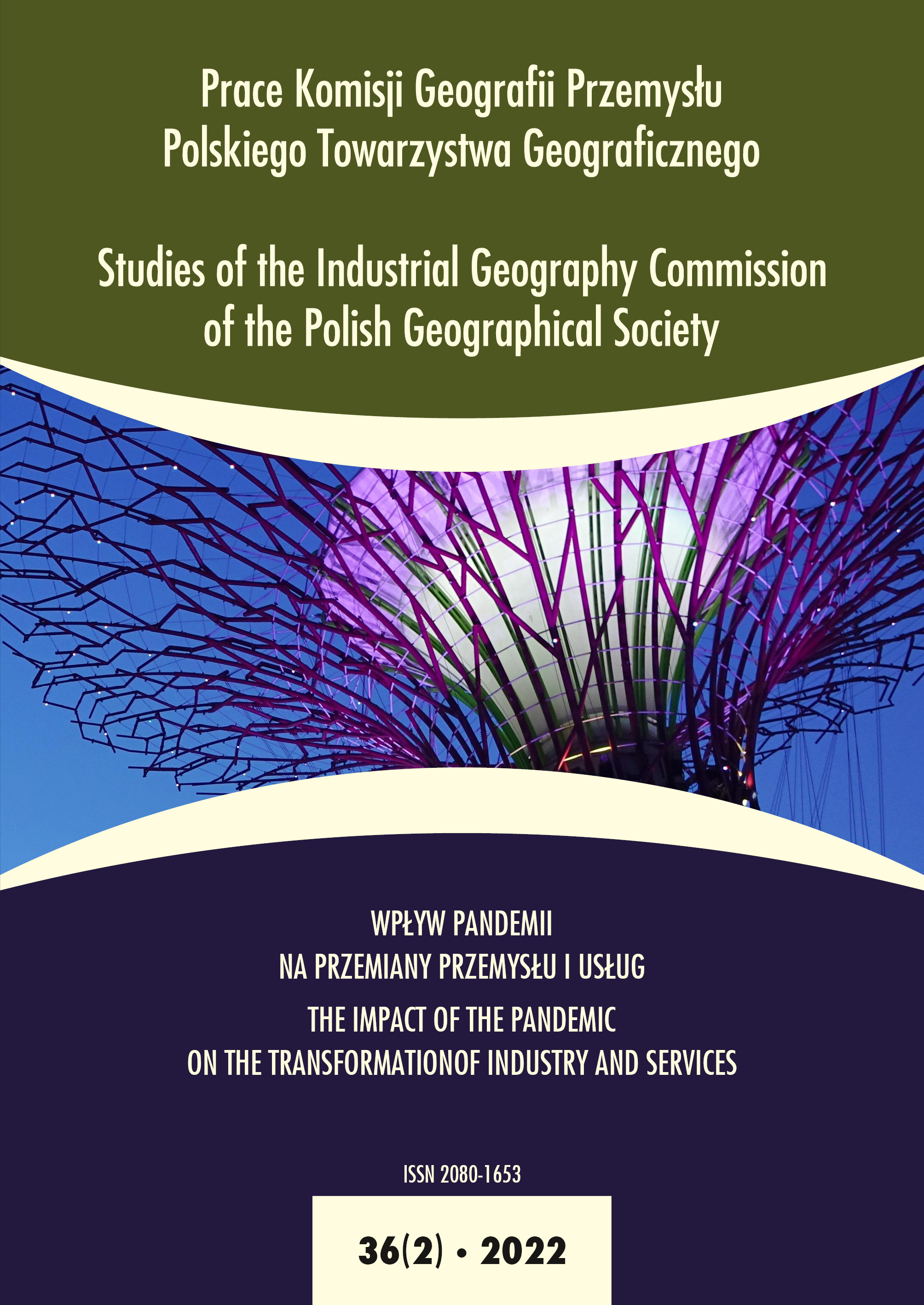The impact of the COVID-19 pandemic on young adults’ market behaviour in the area of sharing economy
DOI:
https://doi.org/10.24917/20801653.362.16Keywords:
sharing economy, COVID-19 pandemic, internet groups, young adults, Focus Group Interview, passive observation, covert participant observationAbstract
One of the key factors that contributed to the development of the sharing economy was the global recession caused by the economic crisis that began in 2008. The economic collapse forced many consumers, struggling with financial difficulties, to limit or even abandon the consumption of certain goods and services. The consequence of this situation was an increased interest in the sharing economy and, as a result, in many cases no need to give up consumption of preferred goods or services. What is more, consumers could access them at a much lower cost than if they purchased them on their own. It is therefore reasonable to assume that the COVID-19 pandemic, which among other things contributed to social isolation and crisis in selected economic sectors, will have a significant impact on people’s behaviour. We can expect, among others, changes in the model of spending leisure time, an increase in the importance of remote customer service channels (e.g. e-commerce, m-commerce), or changes in the approach to sharing economy. The main objective of the article was to define the determinants of the development of sharing economy among young consumers in the period of COVID-19 pandemic. People aged 18-29 (generation C) who are active in the area of sharing economy were surveyed. Focus Group Interviews were used as a research method. The analyses were based on the author’s research workshop developed on the basis of methodological literature.
Downloads
Metrics
References
Akande, A., Cabral, P., Casteleyn, S. (2020). Understanding the sharing economy and its implication on sustainability in smart cities. Journal of Cleaner Production, 277. doi: https://doi.org/10.1016/j.jclepro.2020.124077
Belk R. (2009). Sharing. Journal of Consumer Research, 36, 5, 715–734.
Botsman, R. (2010). Rogers, R. What’s Mine is Yours: The Rise of Collaborative Consumption. New York: Harper Collins.
Botsman, R. (2015). The sharing economy: dictionary of commonly used terms. Pozyskano z: http://www.collaborativeconsumption.com/2015/11/12/the‑sharing‑economy‑dictionary‑of‑commonly‑used‑terms/ (dostęp:17.07.2021).
Caulier‑Grice, J. Davies, A. Patrick, R. Norman, W. (2012). Defining Social Innovation. A deliverable of the pro‑ject: The theoretical, empirical and policy foundations for building social inno-vation in Europe (TEPSIE). European Commission –7th Framework Programme. Brussels: European Commission, DG Research.
Curtis, S.K., Lehner, M. (2019). Defining the Sharing Economy for Sustainability. Sustainability, 11, 3, 567. doi: https://doi.org/10.3390/su11030567
Curtis, S.K., Mont, O. (2020). Sharing economy business models for sustainability. Journal of Cleaner Production, 266. doi: https://doi.org/10.1016/j.jclepro.2020.121519
Dukaczewska‑Nałęcz, A., (1999). Zogniskowane wywiady grupowe – jakościowa technika badawcza. W: H. Domański, K. Lutyńska, A. Rostocki (red.), Spojrzenie na metodę. Studia z metodologii badań socjologicznych. Warszawa: IFiS PAN.
Eckhardt, G.M., Bardhi, F. (2015). The Sharing Economy Isn’t About Sharing at All. Harvard Business Review. Pozyskano z: https://hbr.org/2015/01/the‑sharing‑economy‑isnt‑about‑sharing‑at‑all (dostęp:17.05.2021).
Frenken, K., Schor, J. (2017). Putting the Sharing Economy into Perspective. Environmental Innovation and Societal Transitions, 1, 23, 3–10.
Glinka, B., Gudkova, S., (2011). Przedsiębiorczość. Warszawa: Oficyna Ekonomiczna Grupa Wolters Kluwer.
Kesselring, A. Leitner, M. (2008). Soziale Innovationen in Unternehmen. Study, compiled by order of the Uissueuhe Stiftung. Vienna. Pozyskano z: http://www.zsi.at/attach/Soziale_Innovation_in_Unternehmen_ENDBERICHT.pdf (dostęp:10.05.2021).
Markiewicz, E., (2017). Konsumpcja kolaboratywna jako forma społecznych innowacji na rynku turystycznym. Marketing i Rynek, 11 (CD), 333–344.
Maison, D., (2001). Zogniskowane wywiady grupowe. Jakościowa metoda badań marketingowych. Warszawa: PWN.
Petrini, M., Freitas, C.S. de., Silveira, L.M. da S. (2017). A Proposal for a Typology of Sharing Economy. Revista de Administração Mackenzie, 18(5), 39–62. doi: https://doi.org/10.1590/167869712017/administracao.v18n5p39-62
Plewnia, F., Guenther, E. (2018). Mapping the sharing economy for sustainability research. Management Decision, 56, 4, 1–15. doi: https://doi.org/10.1108/MD-11-2016-0766
Schor, J. Debating the Sharing Economy. Pozyskano z: http://www.greattransition.org/publication/debating‑the‑sharing‑economy (dostęp:13.03.2021).
Szymańska, A.I., (2017). Sharing economy jako nowy trend w zachowaniach konsumentów. Marketing i Rynek, 9, 417–425.
Szymańska, A.I., (2018). Zastosowanie modelowania ścieżkowego w badaniu konsumpcji kolaboratywnej. Prace Naukowe Uniwersytetu Ekonomicznego we Wrocławiu, 525, 68–82.
Szymańska A.I. (2021). The Importance of the Sharing Economy in Improving the Quality of Life and Social Integration of Local Communities on the Example of Virtual Groups. Land, 10(7) 1–17.
Vinod Kumar, T.M., Dahiya, B. (2017). Smart Economy in Smart Cities. W: T. Vinod Kumar (eds), Smart Economy in Smart Cities. Advances in 21st Century Human Settlements. Singapore: Springer. doi: https://doi.org/10.1007/978-981-10-1610-3_1
Worek, B. (2001). Analiza wyników zogniskowanych wywiadów grupowych w badaniach marketingowych, ASK. Społeczeństwo, badania, metody, 10, 25–47.
World Economic Forum 2017, Collaboration in Cities: From Sharing to ‘Sharing Economy’. Pozyskano z: https://www.google.com/url?sa=t&rct=j&q=&esrc=s&source=web&cd=2&cad=rja&uact=8&ved=2ahUKEwi_qZrexZPeAhXEkywKH‑ViZDyQQFjABegQIBxAC&url=http%3A%2F%2Fwww3.weforum.org%2Fdocs%2FWhite_Paper_Collaboration_in_Cities_report_2017.pdf&usg=AOvVaw3_jLjEMfInHMg2ivmyJlb_, (dostęp: 7.05.2021).
Downloads
Published
How to Cite
Issue
Section
License
Copyright (c) 2022 Studies of the Industrial Geography Commission of the Polish Geographical Society

This work is licensed under a Creative Commons Attribution-NoDerivatives 4.0 International License.
Articles are published under the terms of the Creative Commons License (CC BY-ND 4.0; Attribution– NoDerivs).

